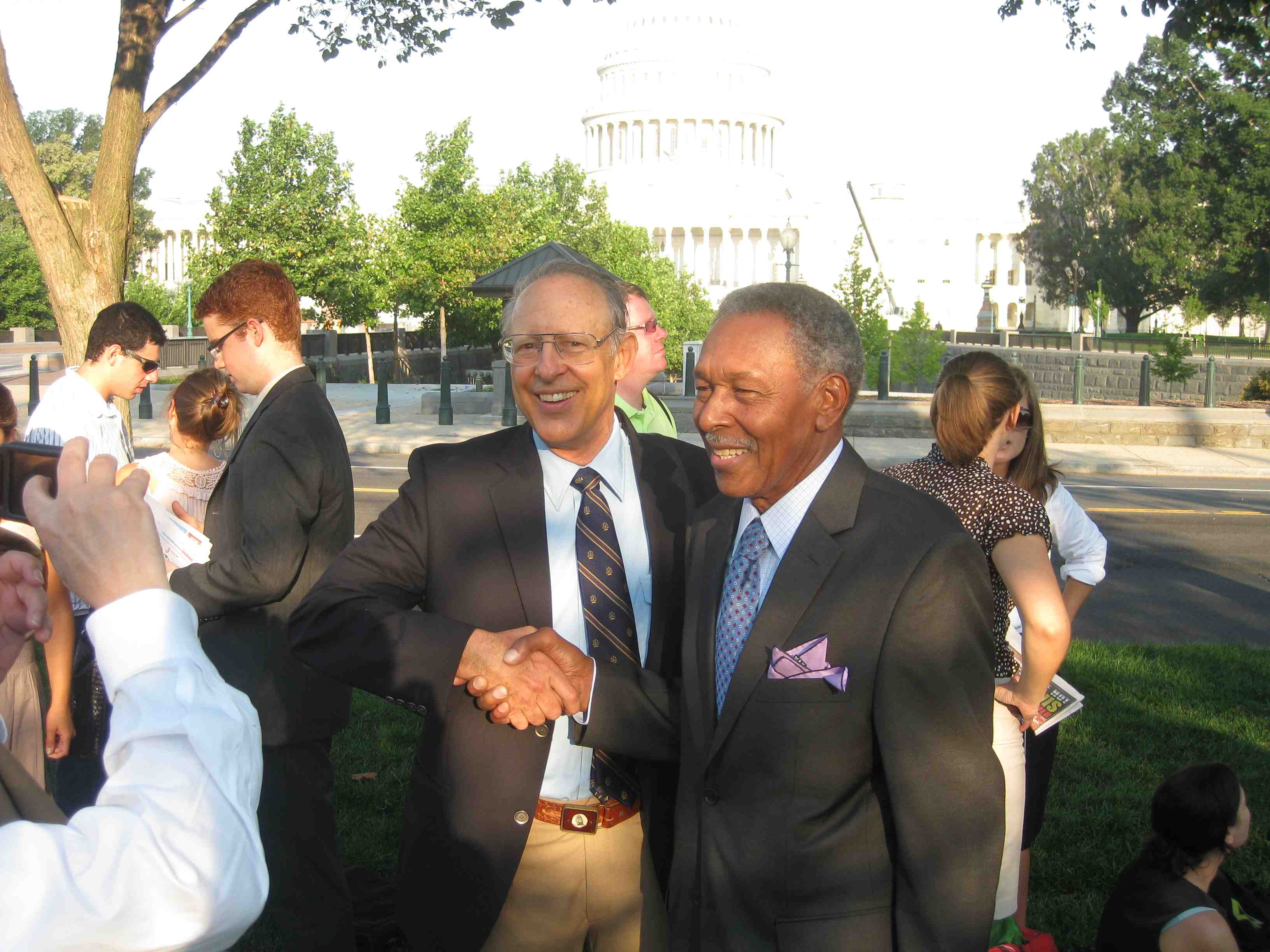A great photo of Dick Heller and Otis McDonald, courtesy of Daniel Rice, taken outside the Supreme Court on June 28, 2010, decision-day of McDonald v. Chicago.

A great photo of Dick Heller and Otis McDonald, courtesy of Daniel Rice, taken outside the Supreme Court on June 28, 2010, decision-day of McDonald v. Chicago.

No one is immune to the perils of the muddled historical record. Even the estimable Justice Clarence Thomas has fallen prey to originalist activism. In his concurrence in McDonald v. City of Chicago, which raised the question of whether the individual states were bound by the Second Amendment, Justice Thomas advocated opening up the Pandora’s box of the privileges or immunities clause of the Fourteenth Amendment, resurrecting it as a route to incorporation of the Second Amendment and who knows what other rights.
From Judge Wilkinson’s new book, Cosmic Constitutional Theory. No, there is no citation to Ilya and my article, Pandora’s Box.
On January 7, 2012, the Josh-and-Ilya show returned to the Next Generation Scholar’s Conference in Washington, D.C. We talked about McDonald v. Chicago and Privileges or Immunities. At 2:50 I fist-pump.
Things like this make me smile:
It turns out San Francisco has not entirely vanquished the Happy Meal as we know it. Come Dec. 1, you can still buy the Happy Meal. But it doesn’t come with a toy. For that, you’ll have to pay an extra 10 cents.
Huh. That hardly seems to have solved the problem (though adults and children purchasing unhealthy food can at least take solace that the 10 cents is going to Ronald McDonald House charities). But it actually gets worse from here. Thanks to Supervisor Eric Mar’s much-ballyhooed new law, parents browbeaten into supplementing their preteens’ Happy Meal toy collections are now mandated to buy the Happy Meals.
Today and tomorrow mark the last days that put-upon parents can satiate their youngsters by simply throwing down $2.18 for a Happy Meal toy. But, thanks to the new law taking effect on Dec. 1, this is no longer permitted. Now, in order to have the privilege of making a 10-cent charitable donation in exchange for the toy, you must buy the Happy Meal. Hilariously, it appears Mar et al., in their desire to keep McDonald’s from selling grease and fat to kids with the lure of a toy have now actually incentivized the purchase of that grease and fat — when, beforehand, a put-upon parent could get out cheaper and healthier with just the damn toy.
It also seems that school lunches would not be healthy enough to satisfy San Francisco’s ordinance.
As a followup to McDonald v. Chicago, through a unanimous opinion from Chief Judge Easterbrook, the 7th Circuit ordered the District Court to award reasonable attorneys’ fees under s. 1988 to counsel, including Alan Gura (my former co-author).
The district court’s decision is reversed, and the casesare remanded for awards of reasonable attorneys’ feesunder §1988.
Following McDonald, oddly, the District Court Judge refused to order attorneys’ fees, finding that Gura, et al, were not victorious in McDonald, because the Court issued no order, and the City “voluntarily” amended their firearm laws. Easterbrook did not buy that, at all.
The district court concludedthat plaintiffs are not “prevailing parties” andthus are not entitled to fees. Chicago and Oak Park contend that Zessar controls:after the Supreme Court issued its opinion, but beforethe district court could enter a final judgment, they repealedtheir ordinances and the suits were dismissed asmoot. That left plaintiffs without a favorable judgment,so Buckhannon disentitles them to attorneys’ fees. Thedistrict court agreed with this line of argument.
The district court was right to observe that plaintiffsdid not receive a favorable judgment from it. But they did better: They won in the Supreme Court, which entered a judgment in their favor. When the SupremeCourt rendered its decision, the controversy was live.
Easterbrook did opine a bit on the merits of McDonald:
The municipalities insist that the Supreme Court’sdecision addressed only “a preliminary legal issue that did not resolve plaintiffs’ claims against Chicagoor Oak Park.” That’s not realistic. Whether the second amendment applies to the states and subsidiary units of government was the issue in this litigation. The Court’sdecision was not just a procedural skirmish. . . . After the Supreme Court held that the second amendment applies to the municipalities’ ordinances, defendants’ positionwas untenable; neither Chicago nor Oak Park contendsthat the ordinance in force in 2008 could have been sustainedunder Heller’s substantive standards. This litigationwas over except for the entry of an injunction bythe district court. Chicago and Oak Park capitulated,which made the exercise unnecessary. By the time defendantsbowed to the inevitable, plaintiffs had in handa judgment of the Supreme Court that gave them everythingthey needed. If a favorable decision of the Supreme Court does not count as “the necessary judicial imprimatur” on the plaintiffs’ position (Buckhannon, 532U.S. at 605), what would?
There was one slight error in Easterbrook’s opinion, discussing the substance of McDonald.
The Supreme Court granted apetition for certiorari and concluded, to the contrary,that the second amendment applies to states and municipalitiesas a matter of due process. McDonald v. Chicago,130 S. Ct. 3020 (2010).
That is incorrect. Only four Justices voted to apply the 2nd Amendment to the state “as a matter of due process.” Justice Thomas, the deciding 5th vote, did not vote for Due Process, but rather relied on the Privileges or Immunities Clause. I expect this error to become more pronounced, but we should not lose focus of how McDonald was actually decided.